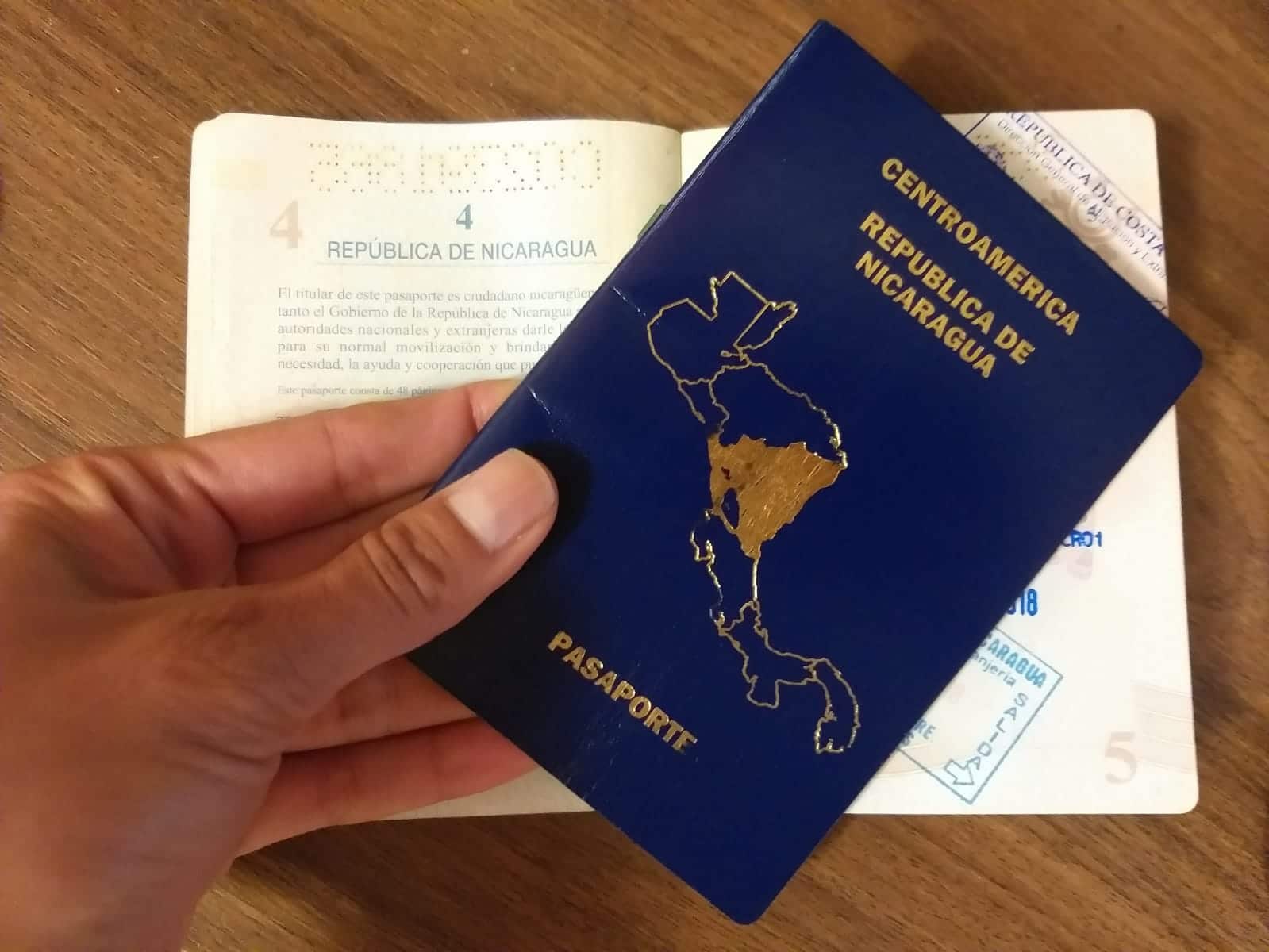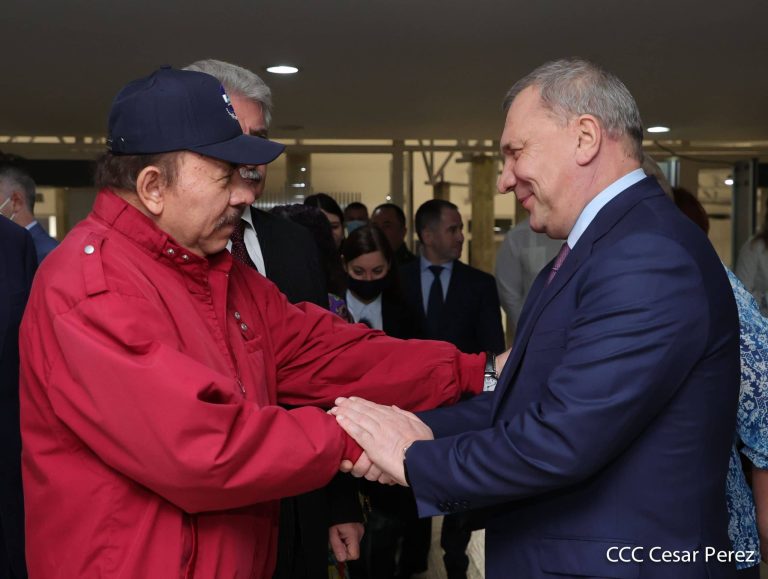2 de marzo 2022

Nicaragua: Public Employees Hindered from Traveling to USA

PUBLICIDAD 1M
PUBLICIDAD 4D
PUBLICIDAD 5D
Putin considers the “reelection” of the Nicaraguan tyrant was “an overwhelming” victory and military agreements are kept secret.

Putin considers the “reelection” of the Nicaraguan tyrant was “an overwhelming” victory and military agreements are kept secret.
Eight days after the presidential inauguration, which only 3 Latin American rulers and a special envoy from Continental China attended, a phone call from Vladimir Putin was received on January 18, 2022, to recognize the reelection of the Sandinista dictator, consolidating the alliance of the two autocrats and activating the promise machinery of the Ortega propaganda.
Vice President Rosario Murillo, with notable enthusiasm, in her midday speech on January 18, 2022, exalted the telephone dialogue as a broad conversation by “between leaders, in which I had the honor to participate.” Efforts that both countries share “for peace in the world” were addressed, and a strengthening of relations occurs when more than 40 countries did not recognize the results of last November’s voting in Nicaragua.
Putin expressed a new congratulation to the Nicaraguan presidential couple because on last November 10 he sent them a letter with his ambassador in Managua, Alexandr Jojolikov, in which he praised the “overwhelming victory”. This demonstrated Ortega’s “political weight,” ignoring the criticism for human rights abuses.
On February 17 in the afternoon, Ortega also received Russian Deputy Prime Minister Yuri Borisov, who promised on behalf of Putin to multiply the two countries commercial relationship. Meanwhile, Ortega publicly supported his ally. A week later Russia invaded Ukraine. The version of the Sandinista ruler is that the Russian struggle is for “peace.”
Since before Putin improvised a visit to Nicaragua in 2014, during a tour in Latin America, Moscow has taken Managua as one of its “main partners” in the region and recently announced that it would increase military cooperation to the Ortega regime and its counterparts in Venezuela and Cuba, led by Nicolas Maduro and Miguel Diaz-Canel, respectively.
On February 5 the Russian ambassador in Managua, Alexandr Jojolikov, told Interfax agency that, for the moment, they are not talking about the emplacement in Nicaragua of military infrastructures.
“Be that as it may, in case of necessity both sides will adopt additional decisions that will meet their national interests. It is their sovereign right,” the diplomat argued about a binational relationship that he described as “strategic” and whose details are unknown to the general public.
Jojolikov made reference to the fact that there is a dozen agreements between military structures and explained that the technical cooperation is aimed at guaranteeing the defense capacities of the Nicaraguan Army, although he clarified that it is not directed “against third countries.”
Since 2008, Putin has politically supported Ortega with decisions that have favored the Sandinista ruler. According to information from the EFE news agency, the Russians have provided the regime with access to 1,100 buses to renovate public transportation, and have donated 32,266 tons of wheat in 2021, with which the dictator has used for proselytizing. “We have the record (of buying buses) thanks to that principle of sovereignty and solidarity practiced by the great power of the Russian Federation,” Ortega said in October 2021.
Putin’s decisions —reciprocated by Ortega with recognition of Russian separatist regions— have strengthened ties.
In July 2021, while criticism from the international community targeted Ortega for imprisoning the main opposition leaders before the voting, the Kremlin received two sons of the presidential family, Rafael and Laureano Ortega Murillo, whom the United States sanctioned for playing an important role in the family business scheme: the first as an investment promoter and the other as the local administrator of Venezuela’s “cooperation”.
Secrecy is a characteristic present in military issues, even if commercial agreements, investments and cooperation in telecommunications are publicly known. In the webpages of the Nicaraguan Army and the Russian Ministry of Defense, the details of the military agreements are non-existent and are limited to photographs between the officials, without further information.
An expert in military matters commented, anonymously to avoid reprisals from the Nicaraguan authorities, that “the information from the Ortega Government is minimal. What is known about the delivery of weapons we have known because the Russian Federation announces it in official media such as Sputnik. But, at least, they announce it. Here they say nothing. In that sense, Russia is more transparent than Nicaragua, although what I am telling you may seem exaggerated.”
The installation of a ground station that allows connection with 24 Russian satellite from a site near the Nejapa lagoon in Managua and a police training center against drug-trafficking, where Central American officers are trained, points to the consolidation of the Russian presence and its projection in the region.
There are no precise details on the overall assistance of Russian cooperation to the Air Force, or any of the other national military directorates. One of the greatest examples of secrecy happened with the shipment of Russian tanks to Nicaragua.
General Julio Cesar Aviles, head of the Army, explained in August 2016 that the acquisition of 50 Russian T-72 tanks will not mean a debt of 80 million dollars for Nicaragua. But the mechanism of their acquisition was not made clear, while publicly one of the tanks was exhibited in the Plaza de La Fe, in Managua, during the 37th anniversary of the institution.
According to the cooperation report of the Central Bank of Nicaragua, Russia has donated US$149.8 million to the public sector between 2007 and 2015. Recently the National Assembly approved the accepting of a 16.8 million euro loan for a term of seven years with a two-year grace period and secrecy also surrounds this agreement. The most disturbing aspect of the relationship between the Ortega regime and Putin is a new weapon to persecute opponents, expressed in an agreement signed with Russia, which, according to digital experts, opens the door to persecution of critics of the power in Nicaragua.
This article was originally published in Spanish in Confidencial and translated by Havana Times
Archivado como:
PUBLICIDAD 3M
Periodista nicaragüense, exiliado. Comenzó su carrera en el año 2000, cuando todavía era estudiante. Por sus destacadas investigaciones periodísticas ha ganado el Premio Ortega y Gasset, el Premio Internacional de Periodismo Rey de España, el Premio a la Excelencia de la Sociedad Interamericana de Prensa, y el Premio Latinoamericano de Periodismo de Investigación del Instituto Prensa y Sociedad (IPYS).
PUBLICIDAD 3D